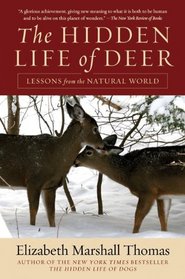As someone who has taken classes in animal biology and intelligence to earn a degree in biology, I was excited to see a book that appeared to be a study of animal behavior. Now, I'm not a believer that science need only be performed by those with degrees or laboratories--anyone with observational skills can be a scientist. That said, Elizabeth Marshall Thomas is not.
She writes about how she attracted the deer for the winter by feeding them corn--she goes on for a whole chapter about why she felt that the laws were BS and that she was just supplementing their diet, saving them from a winter of starvation. If she read up on the subject a bit she'd find that ruminates that eat corn have the acidity in their rumen go up and kill off the good bacteria causing difficulty digesting food and sickness. It's why we pump our cows full of antibiotics and other chemicals during finishing when they are on a high-corn diet. In other words--she not only was harming them but is encouraging others to harm them as well. Deer aren't meant to eat high carbohydrate feed in the winter--their system is meant for fibrous stems and grasses at that time. Please don't follow her lead!
She also doesn't observe so much as come up with her own random hypotheses without actually testing them in any way through her observations. She just gets excited and sees any little details as confirming whatever she believes. At one point in the books she feels she has proof that she could "thought-speak" to one of them. She's very emotional, and I think the biggest example of her misinterpretation of animal behavior is when she thought that the small male deer were claiming a larger buck's territory after he was shot was them "honoring his spirit." No lady, it's very obvious that these animals were taking advantage of the fact that they could look larger than they really are by running their scent all over the areas where he rubbed his antlers higher then they could actually reach.
I would not be so annoyed if this book were touted about what it is--a misguided animal lover who likes to come up with stories about the animals in her backyard. If this were a work of fiction I'd rank it 4 stars--as a book that pretends to be science I'm rating it 1. You will learn nothing of worth here.
She writes about how she attracted the deer for the winter by feeding them corn--she goes on for a whole chapter about why she felt that the laws were BS and that she was just supplementing their diet, saving them from a winter of starvation. If she read up on the subject a bit she'd find that ruminates that eat corn have the acidity in their rumen go up and kill off the good bacteria causing difficulty digesting food and sickness. It's why we pump our cows full of antibiotics and other chemicals during finishing when they are on a high-corn diet. In other words--she not only was harming them but is encouraging others to harm them as well. Deer aren't meant to eat high carbohydrate feed in the winter--their system is meant for fibrous stems and grasses at that time. Please don't follow her lead!
She also doesn't observe so much as come up with her own random hypotheses without actually testing them in any way through her observations. She just gets excited and sees any little details as confirming whatever she believes. At one point in the books she feels she has proof that she could "thought-speak" to one of them. She's very emotional, and I think the biggest example of her misinterpretation of animal behavior is when she thought that the small male deer were claiming a larger buck's territory after he was shot was them "honoring his spirit." No lady, it's very obvious that these animals were taking advantage of the fact that they could look larger than they really are by running their scent all over the areas where he rubbed his antlers higher then they could actually reach.
I would not be so annoyed if this book were touted about what it is--a misguided animal lover who likes to come up with stories about the animals in her backyard. If this were a work of fiction I'd rank it 4 stars--as a book that pretends to be science I'm rating it 1. You will learn nothing of worth here.





